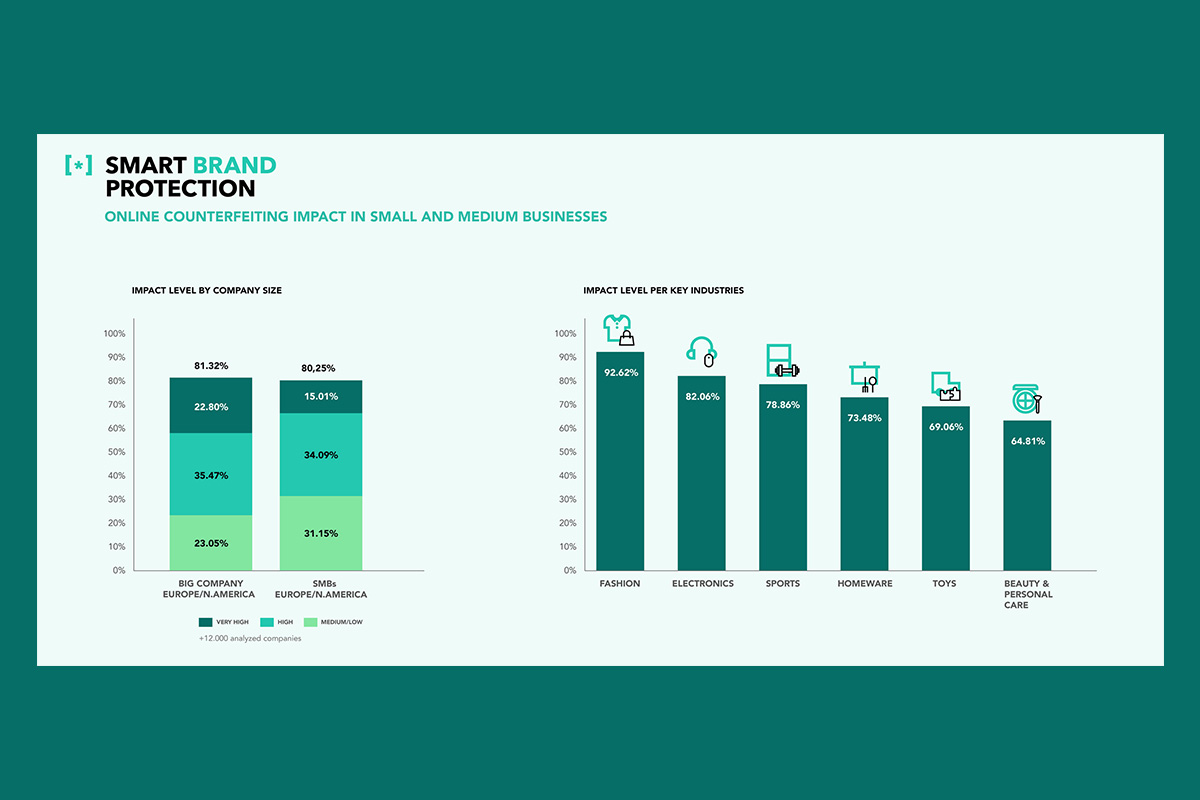Four out of every five small and medium-sized companies in the world suffer from counterfeits and brand abuse on the internet, these illicit products are advertised and sold through digital marketplaces, social networks, and rogue sites (websites that imitate that of the official brand itself). Cybercriminals have put a new focus on their criminal activities on the internet and the trend now is to focus on SMBs that are usually more vulnerable than large companies. The sectors which are most susceptible to such infringements are listed in order as follows, fashion, sports, electronics, homeware, toys and beauty & personal care.
These are the main conclusions of a study, conducted by Smart Protection, a cybersecurity company that reduces the impact that piracy and counterfeiting have on its clients´ content and brands. This study – “Impact of online counterfeits in SMBs 2021” – highlights the vulnerable situation of small and medium sized companies on the internet, and the need to have an effective and reliable technology that allows them to monitor their products online. It was released on World Intellectual Property Day (IP World Day) – which is celebrated this April 26th and promoted by WIPO (World Intellectual Property Organization).
To conduct this study, Smart Protection analysed more than 12,000 companies that sell products online, of which 5,178 are SMBs with between 1 and 200 employees, tracking marketplaces, social networks, and rogue sites on Google in search of possible infringements. This study is based on companies headquartered in Europe and North America.
Breaking down the data, 80.25% of SMBs that sell their products online suffer from counterfeits on the internet. Of this percentage, 15.01% of them suffer from exceptionally high levels, 34.09% experience what is classed as high values, and 31.15% are affected in a medium or low way. Therefore, just 19.76% of the SMBs analyzed do not have any online infringements.
Comparing these SMB counterfeiting figures with those of large companies, the figure is slightly higher, confirming the trend for offenders to focus on more vulnerable SMBs and companies. 81.32% can find fake copies of their products on the internet. 22.80% suffer it at a very high level, another 35.47% are at high values, and 23.05% are less significantly affected.
Fashion, the greatest victim
The fashion sector is the industry that suffers the most from this illicit activity. It is the sector that tops the ranking of the most counterfeited, while it is also the one with the most SMBs suffering from this problem at a very high level. To be exact, 92.62% of SMBs in the sector are affected, followed by the electronics sector (82.06%), sports (78.86%), homeware (73.48%), toys (69.06%), and beauty and personal care (64.81%). These last two sectors are especially sensitive, since a counterfeit has the potential to cause injury to adults and minors.
The study, which analyses what happens to the products of an SMB on the internet, is focused on countries in Europe and North America and concludes with a ranking that illustrates where it is more common to find highly affected SMBs. SMBs from the US attract the most attention from cybercriminals. In Europe, the top is made up of the UK, Italy, and France, closely followed by Spain and Germany.
Javier Perea, CEO of Smart Protection, has assured that: “Counterfeits on the internet are becoming more sophisticated every day. Cybercriminals can quickly select and copy emerging brands that are experiencing notable growth in their digital sales. This has a direct impact on the most innovative products in the portfolio of small and medium-sized companies. This situation can pose a serious threat to their brand reputation and revenue, and it is especially sensitives for SMBs that are expanding into new markets”.
Smart Protection aims to minimize the negative impact on sales and brand reputation that counterfeits, brand abuse, and piracy inflict on its customers. Its technological platform is based on artificial intelligence to monitor possible infringements in real-time, analyzing and eliminating illegal copies and falsifications which infringe its intellectual property rights. The company has clients in more than 25 countries and works with both large companies and SMBs across various sectors.















Got a Questions?
Find us on Socials or Contact us and we’ll get back to you as soon as possible.